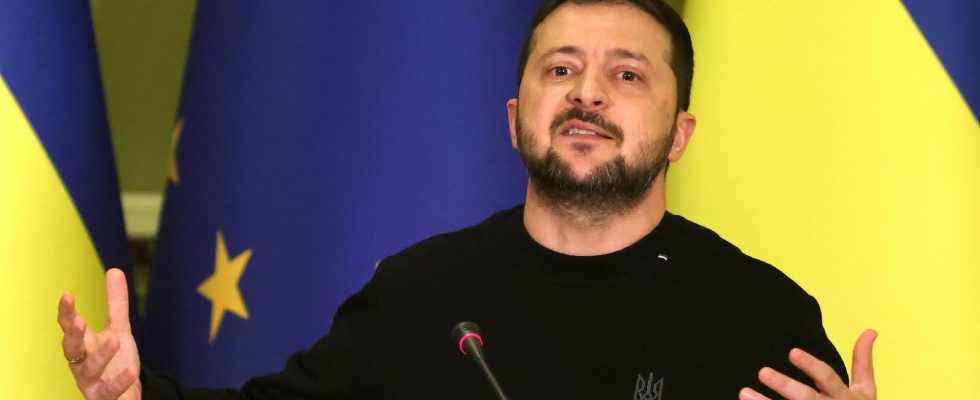Will the Ukrainian presidential election be held in 2024? This is the question that arises as the end of the five-year term of President Volodymyr Zelensky, elected by direct universal suffrage in 2019, approaches. Foreign Minister Dmytro Kouleba admitted this Friday, November 2 on the sidelines of World Policy Conference in Abu Dhabi (United Arab Emirates), “weigh the pros and cons” of organizing this election, despite the war and the many practical “challenges”. Although Western pressure on whether or not to hold this election is increasing, the legislation should notably be changed, as the martial law put in place since the start of the Russian invasion prohibits any election.
Which does not seem to be an obstacle for Volodymyr Zelensky. At the beginning of September, during the annual Yalta European Strategy conference in Kiev, he said he was “ready” to organize elections in his country in times of war, “if the people need it”. “For the Ukrainian president, holding elections is technically possible. There is no opposition in principle to it,” Alexandra Goujon, lecturer at the University of Burgundy and author of Ukraine: from independence to war (Editions Le Cavalier bleu). However, the Russian invasion and the fighting obviously complicate the process. “It is not a question of democracy”, but “only of security”, President Zelensky further assured in September, stressing that there were “many” problems to be resolved.
Many unknowns
Among these, the vote of soldiers who fight in the trenches, or the arrival of international observers in a war zone, he explained. A list to which Dmytro Kouleba added, on Friday, the organization of the vote for the 8 million Ukrainians abroad and the risk that polling stations in Ukraine become “perfect targets for missiles and drones Russians. To allow refugees to vote, for example, polling stations would have to be set up across Europe. However, foreign countries cannot accept offices outside Ukrainian representations.
Other unknowns: the progress of the electoral campaign, while gatherings are prohibited, and its financing. In peacetime, organizing elections costs 5 billion hryvnias (125 million euros), noted Volodymyr Zelensky. He said he did not know what that budget would be in wartime. In any case, the Ukrainian president ruled out the possibility of “taking money from arms and giving it to elections.”
Ukraine, a “democracy at war”
The dilemma over the organization of elections in time of war returned to political discussions at the end of August, when US Senator Lindsey Graham (Republican), traveling in Kiev, called on the authorities to organize “free and fair”, despite the continuation of Russian attacks. Volodymyr Zelensky replied that the vote could be held in particular if the United States and the European Union shared the costs of setting it up.
“At present, there is consensus on the absence of a need for a presidential election. This subject is not very divisive. For the Ukrainians, the priority is war and victory is everything”, insists specify Alexandra Goujon. However, it would not be relevant for those in power to already state that the election will not be held: “On the one hand, we cannot predict what will happen in the coming months on the ground in particular, which could be likely to change the situation. On the other hand, if the government already admits that the election will not be held, the risk is that public opinion will rebel, admits the specialist in Ukraine. That would mean that we are no longer in a democracy. But Ukraine wants to show itself as a democracy despite the war.”
Domestic policy debate relaunched
However, could things change? If Zelensky has not clearly said whether he will run for a second term, one of his former advisors, Oleksiy Arestovitch, who fell from grace shortly after the start of the war, has already announced his presidential ambitions. “In certain scenarios, I have every chance of being the next president of Ukraine,” he said on November 3 to the Russian newspaper in exile Meduza. Oleksiy Arestovitch is in favor of a temporary solution, suggested by the American diplomat Henry Kissinger, to put an end to hostilities: leaving Crimea and Donbass in the hands of the Russians, while waiting for the successors to Vladimir Putin to be named. “I am confident that they will be more sane than him and his entourage.”
For academic Alexandra Goujon, Oleksiy Arestovitch’s desire to stand as a candidate in the next presidential election “even further reinforces the idea of the risk of preparing an election for Ukrainians.” According to a survey conducted in September 2023Arestovitch was one of the political figures towards whom widespread distrust was expressed (more than 70% of those questioned).
“The only thing that could change things today would be for the Ukrainian president to take a decision that the people disapprove of, such as, for example, sitting down at the negotiating table unless he provides an unstoppable justification,” said Alexandra Goujon. The discussion around whether or not to maintain the presidential election is in any case relaunching the domestic political debate. It remains to be seen what it will be based on: what is the objective of this election? Better win the war? What more could whoever wins the election do? One thing is certain: the priority today remains victory against Russia.
.
